- Home
- Michael Byrnes
The Sacred Blood Page 25
The Sacred Blood Read online
Page 25
Kwiatkowski sighed. “The rabbi’s wife has the cash?” He glared at Orlando in the mirror.
“That’s right.”
“Euros, not shekels?”
“Right.” With a lightning-fast draw, Orlando pulled out his gun and fired once into Kwiatkowski’s left ear.
The giant rocked sideways and struck the wall where the round had cracked through the tiles. Blood and brain matter smeared as he crumpled to the floor.
Holstering his gun, Orlando made his way outside.
64
******
Orlando moved quickly down the corridor toward the light coming out of the conference room, the gun swinging like a pendulum in his right hand. “Mrs. Cohen?” he called out.
As he drew nearer the conference room, shadows moved across the light. Then the matronly Hasidic woman in her ankle-length dress seemed to glide out of the room, hands folded.
“Yes, in here, please,” she said in a lukewarm manner.
The assassin’s muscles eased up as he passed by her and cautiously entered the room with the gun drawn.
“Where is your partner?” she asked, coming in behind him.
“He went ahead to the hospital.”
“His arm?”
“An awful thing,” the contractor confirmed. “I’ll be handling matters on his behalf,” he firmly replied, his deadpan face clearly communicating that he shouldn’t be questioned any further.
A haunted expression came over his face when he saw the rabbi’s son across the room, standing next to the silver safe case. When he’d first arrived, the emaciated, ghost-white kid had been curled up in a wheelchair. Less than an hour after he came out of the room where the geneticist had been detained, he’d started rambling excitedly about his legs, how he could feel strange sensations. Then the kid had clumsily pulled himself up from the chair. It hadn’t been pretty, but the kid managed to stand, using the wall and the chair for support. But he was definitely up and about, crying like a baby, his cheeks flushed with rosy color. The circumstances seemed highly suspicious, so Orlando had immediately fetched the rabbi. The rabbi’s genuine astonishment had not been what he’d expected.
The boy’s condemnatory stare sent a freakish coldness over Orlando. He paced over to the case and ran his fingers over its small keypad.
“Don’t worry. Your blood money is all there,” Mrs. Cohen said.
The woman certainly wasn’t looking to win any popularity contests. “The code?” He tucked the gun into his underarm holster since he’d need both hands to open the case.
She gave him the sequence.
Orlando keyed in the numbers and the locks snapped open inside the case. Grinning, he unhinged the cover. The smile immediately faded when he looked down at the neat stacks of bills. “Shekels?” he grunted.
“It’s perfectly good money,” the wife confirmed.
“I specifically requested Euros, not this Jew money. Now where am I supposed to go to trade this at this hour?”
“So open a bank account in the morning,” she coldly replied.
“You think you’re funny?” he hissed. Pulling his gun, he swept it up at the son’s pale face. “I can be funny too.”
Without warning, the wooden panel covering the front of the table splintered open around a clean hole. At the same time, Orlando felt a wretched pain tear up through his abdomen and into his chest—an invisible spear impaling his body. “Wh—what . . . ?” Blood pulsed out in quick bursts from above his navel and sprayed onto the shekels. Absorbed in the absurdity of it, he hadn’t noticed the boy scamper off behind him. He backed up from the table, dazed. Delirious, he swung the gun side to side, squeezing off haphazard shots—at the table, at the ceiling, over his shoulder. “Fucking scumbags!” he slurred.
The gun’s ammo clip emptied quickly.
That’s when a broad man with a goatee sprang up from underneath the table and fired three more rounds into his chest.
Orlando crashed onto the conference table, blood spreading out smoothly over the freshly polished finish. He tried to curse them once more, but the words drowned in the bile and blood that gurgled into his throat. The rabbi’s wife came and stood beside the table, arms crossed tight in front of her chest. It was the first time he’d seen her smile.
He felt her spit strike his eye just as the darkness took hold.
65
******
By the time Amit got his shoes on, made it back downstairs, and bounded out the rear service door with gun drawn, the delivery van was gone. No surprise. Oddly, however, the flatbed truck had gone missing too.
The fragmented story that Mrs. Cohen had told him was almost too incredible to believe. Yet even if she’d embellished a half-truth, the implications of what Rabbi Cohen had in store for the Ark and the captive “Messiah” were shocking.
Immediately, Amit broke into a sprint to get back to the car. Midstride, he pulled out his cell phone and hit the send button. The call took three rings to connect. As always, Enoch was heedful about answering his call, no matter what the hour.
“Hey,” he said between heavy breaths.
“Are you having sex?” Enoch joked.
Under better circumstances, Amit would have laughed heartily. “I
need”— breath—“your help. It’s critical.”
His tone instantly went serious. “Tell me.”
“Just a sec,” Amit said as he approached the car, ducked inside, and
fumbled for the key. The Fiat’s engine turned over with a growl. “Where are you?”
Amit told him as he threw the car into drive and peeled out along the
curved road. He paused to regulate his lungs, then laid out the facts he’d confirmed with the rabbi’s wife—the abduction of an American geneticist, the clandestine shipment flown back from Egypt.
“And where’s Cohen heading?”
“The Temple Mount.” When Devora had told him this, his heart had almost given out. “Something to do with the excavation in the Western Wall Tunnel. I’m not sure about that part.”
“What’s in the box?” Enoch had to ask.
“Something very dangerous.”
This made Enoch fear the worst, because some hard-core Zionists were considered religious extremists, even terrorists. The Mossad kept a very close eye on the select few considered credible threats. Yet somehow Rabbi Cohen had remained below the radar. “A bomb?”
Amit liked the way this proposition resonated with Enoch. So he went along with it. “That or something worse.” If it really was the Ark in that box, he wasn’t stretching the truth.
Along the straightaway below the Temple Mount’s eastern wall, he gunned the engine to swerve around a Toyota sedan moving sluggishly along Derech Ha’ofel. “I’m just about there now,” Amit told him. “You need to get over here immediately—the Western Wall Plaza. And call for backup.”
“All right, Commander,” he said, thinking back to the old days. “I’m on my way. Give me ten minutes. Just sit tight outside the gate—and don’t do anything crazy until I get there.”
Luckily, though Enoch periodically reported to Tel Aviv, he spent three days each week telecommuting from his Jerusalem condominium on Derech Beit Lehem.
Amit pushed the car to its limit as the headlights cut a straight line below the white tombs heaped up along the Temple Mount’s eastern wall.
Amit’s fears deepened. The Old Testament depicted the Ark of the Covenant as a telephone to heaven—a vessel through which Moses and Aaron communicated with God in the Tabernacle. And it was the Ark that could summon God’s essence in the form of a brilliant light—the Shechinah. The Ark’s roster of supernatural powers included an ability to levitate and strike down scorpions and dangerous predators with bolts of energy. It could push back rivers and move earth. It could spontaneously combust anyone who came into contact with it.
But what troubled Amit most was the Bible’s detailed descriptions of the Ark as antiquity’s ultimate weapon of mass destruction, capable of
channeling God’s wrath to annihilate armies and decimate cities. Could this
be what Cohen was really after? And this woman who Joshua had dubbed
the Messiah? Well, if this was what Cohen believed, then it stood to reason
that he was convinced that the American was meant to usher in a day of
reckoning that would reinstate Zion as the epicenter of God’s world. He
couldn’t suppress the images of a decimated Temple Mount and a grand
Temple City rising from the ashes.
Scary stuff.
No. Crazy stuff.
The man of science and reason in him couldn’t believe what he was
envisioning. Yet everything in his gut told him it made sense. The second
book of the Pentateuch (the Torah), Exodus, described the Ark of the Covenant as a cubit and a half in height and width, two and a half cubits in
length. Most believed the cubit God was referring to then probably hadn’t
been the same one conveyed to Noah for construction of his seaworthy
ark. Since Moses was an Egyptian, he’d have employed the Egyptian royal
cubit. In modern terms, that put the Ark’s proportions at about three quarters of a meter high and wide, and under a meter and a half long. Indeed, the crate Amit had seen Cohen’s cronies wheeling out of the
museum could have easily held it.
It took him less than a minute to cut through the Kidron Valley and approach the gate where tour buses entered the Old City to drop their loads
outside the security gates—the Dung Gate. Unfortunately, the very short
ride from the Rockefeller Museum and the rabbi’s significant head start
practically guaranteed that he’d already made it inside.
Instead of drawing attention by heading through the gate, Amit hung
a left where a brown road sign pointed to the City of David in English and
Hebrew. He immediately steered to the curb.
When he got out of the car, a pair of Palestinians huddled on stools over
a backgammon board began yelling at him in Arabic, pointing to the car,
gesturing in impolite ways for him to move it.
With no time to argue with them, Amit tossed the key ring onto the
game board and told them, “It’s yours. Take it.”
Then he set off for the gate.
66
******
Rabbi Aaron Cohen’s mind was stretched to the limit. Things had gotten very sloppy, and any semblance of his original plan had long since vaporized. The killings were to be expected. Sacrifice was always required. The fact that the assassin assigned to eliminate Amit Mizrachi had not reported back to the museum, however, was deeply troubling. Could the archaeologist still be alive?
Then he thought back to the Muslim who’d snuck into the tunnel and managed to report to someone on the outside about what he’d seen beneath the Temple Mount—the event that put everything into fast-forward. Whom had he called? What would the response entail? Too many possibilities.
But if there was a destiny for the Ark, it certainly was in the Lord’s hands now. After so many, many centuries, the Testimony was back in Zion—ready to fulfill the great prophecies put into motion two thousand years earlier by Jesus.
“Unload the truck,” Cohen instructed his foreman.
The man, dressed in a blue Israel Antiquities Authority jumpsuit and white hard hat, looked warily over the rabbi’s shoulders at the six IDF guards standing watch at the archway. They were all busy talking and smoking. “What about the soldiers?”
“Don’t worry about them,” Cohen said. “They’re clueless. If they cause any problems, you do whatever it takes to hold them back.”
The anxious foreman had no more questions and began shouting orders to the men gathered around the side of the flatbed truck that had backed in beneath Wilson’s Arch.
Cohen watched as another crewman rolled a forklift closer, raised the fork, and eased it under the first pallet. The machine’s engine rumbled heavily, its frame groaning under the extreme weight. Then came loud beeping as the machine reversed in a slow arc and maneuvered to set the pallet down on the ground. The process repeated as the second batch of stone was unloaded.
Once the forklift spun back into its parking spot and the engine was shut off, Cohen said to the foreman, “Unpack them and bring them straight inside, understand?” He pointed to the pallets.
“Right away.”
“I need to get ready. I’ll meet you there.”
Pacing over to the white delivery van, Cohen opened the passenger door and retrieved his black garment bag and tote. Then he headed down the steps and into the Western Wall Tunnel.
67
******
“Sorry, Commander,” Enoch said, jogging over to Amit outside the Dung Gate with a lit cigarette dangling from his right hand.
“If this was Gaza, I’d have you reported to the aluf ’s office,” Amit said with a grin. “But five minutes is a forgivable offense in the civilian world.” He gave his friend a handshake and embraced him. “I really appreciate your coming.”
“Wouldn’t miss this for the world,” he said with a sardonic grin.
The image of Enoch that would be forever stuck in the back of Amit’s head—a painfully thin, timid kid—did not match the man who stood before him. At least thirty pounds heavier, and none of it flab, Enoch was an intimidating fellow. In fact, it looked like he could bench-press a car. His face had filled out too—more handsome, yet the same bony nose and undersized chin.
“Still haven’t given up on those things?” Amit said, pointing to the cigarette. “Why kill yourself? You’ve got a family now.”
Enoch raised his eyebrows, took a final drag, and tossed the butt to the ground. As he stubbed it out with his foot, he replied, “Living in Jerusalem and working for Israeli intelligence?” He smirked. “Cigarettes are the least of my worries.”
“Good point. Were you able to call ahead to anyone?” Amit asked. He could sense an apology coming.
“I tried,” he said. “But I was told that the area is already under heavy supervision. The IDF is working triple-time in there.” His eyes motioned ahead to the Western Wall Plaza.
“You didn’t mention the abduction?”
“Of course I did. But according to those guards over there”—he pointed to the service gate left of the tourist depot—“Cohen just went inside and there was no woman, no crate.”
What?
“So unless we have proof, suffice it to say that the rabbi is untouchable. Your word against his. And I shouldn’t even be here with you, because there’s an ex-IDF man with a bullet in his neck who was just scooped off the pavement at the Israel Museum.”
Amit’s expression turned sour.
“Lots of witnesses there said a big guy with a cargo vest and a goatee downed him. Way to keep a low profile,” he lightly jabbed. “Bottom line is, you’re wanted for questioning. Didn’t exactly help me to escalate matters, if you know what I’m saying. You could’ve told me, you know.”
Now Amit was the apologetic one. “Sorry about that.”
“No worries. Good shooting, though,” he said. “You got the guy right in the spine.”
“I was aiming for the chest, but thanks anyway.”
“You still armed?”
Amit flashed David’s Beretta, then dropped it back in his deep vest pocket.
Enoch’s left eyebrow tipped up. “It’ll have to do. Let’s get in there.” He set a brisk pace along the drive leading to the security barrier and turnstiles that cordoned off the plaza.
“You’re sure about all this, Amit?” Enoch asked.
“Was I ever wrong in Gaza?”
“No, sir,” he replied with assurance. It still amazed him that Amit hadn’t pursued a career with the military. He was a natural leader with a brand of cunning born from instinct, not training. Rumor had it, however, that Amit’s proficiency in archaeology was
even more impressive. “So it’s just like old times, eh?”
“That’s right. Now work your magic with these guys and get us down into that tunnel.”
They slowed when the guards at the main gate saw them coming and stood.
Enoch dipped unthreateningly into his pants pocket for his Mossad ID badge.

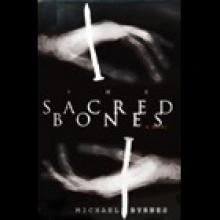 The Sacred Bones
The Sacred Bones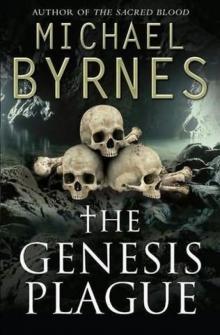 The Genesis Plague (2010)
The Genesis Plague (2010)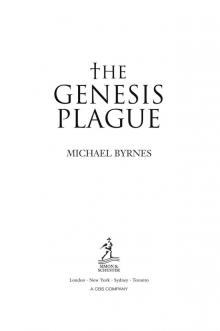 The Genesis Plague
The Genesis Plague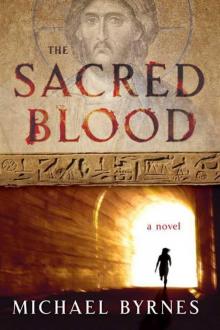 The Sacred Blood
The Sacred Blood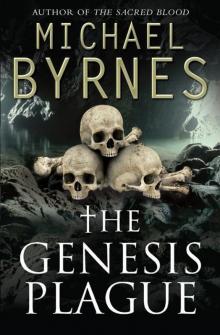 The Genesis Plague tf-1
The Genesis Plague tf-1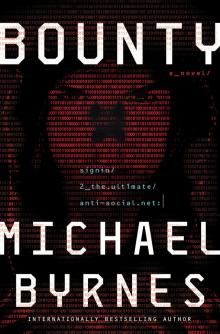 Bounty
Bounty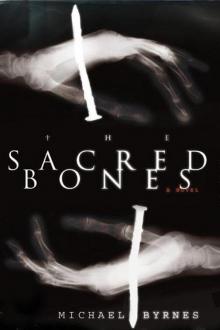 Sacred Bones : A Novel
Sacred Bones : A Novel